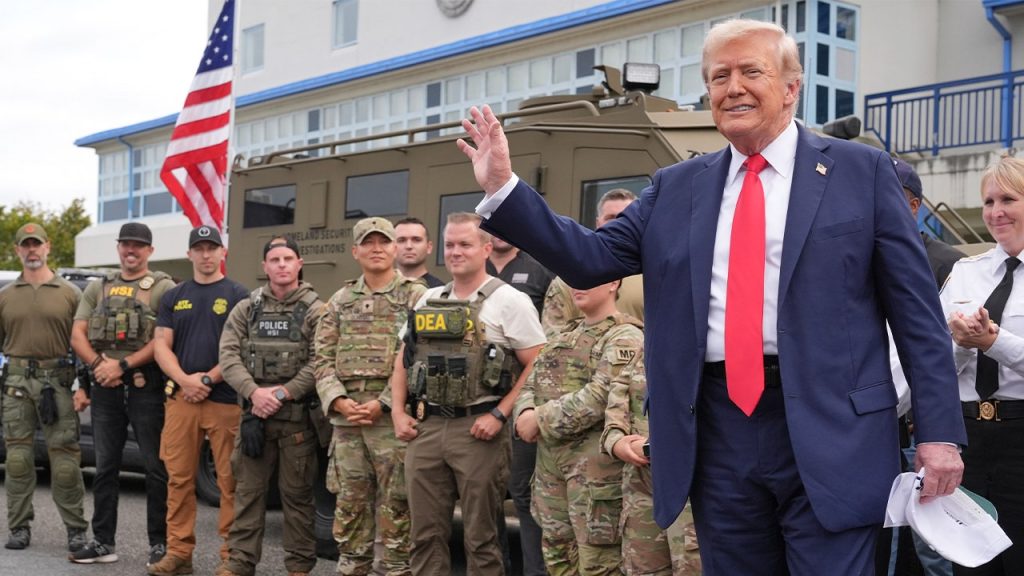Trump Administration Works with Congress to Transform D.C. Governance
President Donald Trump and congressional Republicans are collaborating on an ambitious agenda to reshape governance in Washington, D.C., particularly focusing on law enforcement and crime reduction. According to a leadership aide who spoke with Fox News Digital, House Republicans are actively developing legislation alongside the White House aimed at addressing what they describe as “many problems with D.C. governance and crime.” Trump himself acknowledged these efforts in a midnight Truth Social post on Wednesday, announcing that House and Senate leaders are working with him on a “Comprehensive Crime Bill” that he believes the country urgently needs.
At the center of this initiative is the president’s authority over the District of Columbia’s police force. Under the District of Columbia Home Rule Act of 1973, which established local government for the nation’s capital, the president has the power to federalize D.C.’s police for an initial period of 48 hours, which can be extended to 30 days with proper notification to relevant congressional committees. Any extension beyond that timeframe currently requires formal authorization through resolutions passed by both chambers of Congress. However, multiple Republican lawmakers are now introducing legislation to expand these presidential powers. Representative Andy Ogles (R-Tennessee) proposed amending the Home Rule Act to allow the president to “extend this emergency as long as it takes, until our Capitol is taken back, and its streets are safe.” Though his bill would remove the 30-day limit, it maintains a requirement for the White House to notify Congress every 30 days about the justification for continued federalization, which Ogles emphasized was important to “abide by” constitutional principles.
Similar proposals have emerged from other Republican representatives, including Anna Paulina Luna (R-Florida) and Andy Biggs (R-Arizona), demonstrating growing support within the GOP for strengthening presidential control over D.C. law enforcement. Luna’s bill, like Ogles’, would allow the president to federalize D.C. police for an indefinite period as deemed necessary. She defended this approach by stating it’s “well within our right and authority” under home rule provisions and argued the changes would benefit both lawmakers and “actual civilians in the Washington, D.C., area.” Biggs has taken a slightly different approach, with his legislation proposing to extend presidential control over D.C. police for a fixed period of six months. These various proposals reflect a broader strategy among Trump allies to consolidate federal authority over the nation’s capital.
The legal foundation for these efforts stems from D.C.’s unique status as a federal district rather than a state, which grants Congress and the federal government substantial control over its governance. The Trump administration has been quick to highlight what they characterize as positive results from federal intervention, claiming a significant decrease in homicides since the president took control of policing in the city. This messaging serves not only to justify the current actions in D.C. but also to signal that similar federal interventions might be forthcoming in other U.S. cities struggling with crime issues. The White House appears to be framing these efforts as part of a broader vision to transform the nation’s capital into “the envy of the world,” with a White House official noting that addressing “underlying causes of the DC crime problem” will remain a focus alongside other municipal issues like “maintenance, transportation and beautification.”
Democratic opposition to these measures has been substantial, with critics arguing that the Trump administration is effectively stripping autonomy from D.C. residents. This tension highlights the ongoing debate about the appropriate balance between federal oversight and local governance in the District of Columbia, a jurisdiction whose residents have historically had limited self-determination compared to those living in states. The conflict reflects deeper partisan divisions about approaches to public safety, urban governance, and the proper scope of presidential power. For Democrats, these moves represent an overreach that undermines democratic principles; for Republicans, they represent necessary interventions to address crime and governance issues in a city of unique national importance.
As Congress returns from its August recess, the various proposals to extend Trump’s control over D.C. policing will likely be consolidated into a comprehensive package of legislation. House GOP leadership appears receptive to these ideas, though the specific form they will ultimately take remains to be determined. What is clear is that the relationship between the federal government and the District of Columbia is undergoing a significant transformation under the current administration, with potential long-term implications for the governance of America’s capital city. This evolving situation represents not just a policy shift but a fundamental reexamination of D.C.’s unique status within the American federal system and the extent to which its affairs should be subject to direct presidential and congressional control.
The developments in D.C. may also serve as a template for how the Trump administration approaches urban governance and crime issues more broadly across the country. By framing federal intervention in D.C. as a success story in crime reduction, the administration could be laying groundwork for similar actions in other major cities, particularly those with Democratic leadership. This approach aligns with Trump’s campaign rhetoric promising to restore “law and order” and suggests that the current focus on D.C. may be just the beginning of a more expansive effort to increase federal involvement in local law enforcement nationwide. As these initiatives unfold, they will likely continue to generate intense debate about federalism, local autonomy, and the proper role of presidential power in addressing urban challenges.


